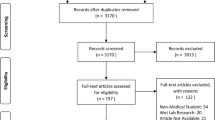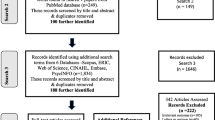Abstract
Background
The ability to provide optimal care to cancer patients depends on awareness of current evidence-based practices emanating from research or involvement in research where circumstances permit. The significant global variations in cancer-related research activity and its correlation to cancer-specific outcomes may have an influence on the care provided to cancer patients and their outcomes. The aim of this project is to develop a global curriculum in research literacy for the surgical oncologist.
Materials and Methods
The leadership of the Society of Surgical Oncology and European Society of Surgical Oncology convened a global curriculum committee to develop a global curriculum in research literacy for the Surgical Oncologist.
Results
A global curriculum in research literacy is developed to incorporate the required domains considered to be essential to interpret the published research or become involved in research activity where circumstances permit. The purpose of this curriculum is to promote research literacy for the surgical oncologist, wherever they are based. It does not mandate direct research participation which may not be feasible due to restrictions within the local health-care delivery environment, socio-economic priorities and the educational environment of the individual institution where they work.
Conclusions
A global curriculum in research literacy is proposed which may promote research literacy or encourage involvement in research activity where circumstances permit. It is hoped that this will enhance cancer-related research activity, promote awareness of optimal evidence-based practices and improve outcomes for cancer patients globally.

Similar content being viewed by others
References
Greenhalgh T. How to read a paper: the basics of evidence based medicine. 3rd Revised ed. Hoboken: Wiley; 2006.
Torgerson DJ, Torgerson CJ. Designing randomized trials in health, education and the social sciences: an introduction. Basingstoke: Palgrave MacMillan; 2008.
Glasziou P, Chalmers I, Rawlins M, McCulloch P. When are randomized trials unnecessary? Picking signals from noise. BMJ. 2007;334:349.
Doren EL, Miranda RN, Selber JC, Garvey PB, Liu J, Medeiros LJ, Butler CE, Clemens MW. U.S. epidemiology of breast implant-associated anaplastic large cell lymphoma. Plast Reconstr Surg. 2017;139(5):1042–50. https://doi.org/10.1097/PRS.0000000000003282.
Hunnisett A. BMJ research methods and reporting: reporting research. BMJ and BPP Publishers; 2016.
McCulloch P, Cook JA, Altman D, Heneghan C, Diener MK. IDEAL framework for surgical Innovation 1: the idea and development stages. BMJ. 2013;346:f3012.
Tong A, Sainsbury P, Craig J. Consolidated criteria for reporting qualitative research (COREQ): a 32-item checklist for interviews and focus groups. Int J Qual Health Care. 2007;19(6):349–57.
Petrie A, Sabin C. Medical statistics at a glance. 3rd ed. Hoboken: Wiley; 2013.
Ahn R, Woodbridge A, Abraham A, Saba S, Korenstein D, Madden E, Boscardin WJ, Keyhani S. Financial ties of principal investigators and randomized controlled trial outcomes: cross sectional study. BMJ. 2017;356:6770.
Shahzad A. Translational medicine: tools and techniques. 1st ed. Cambridge: Academic Press; 2015.
Jalali M. Saldanha FYL, Jalali M. Basic science methods for clinical researchers. Cambridge: Academic Press; 2017.
Cross J. Impact factors – the basics. The e-resources management handbook. UKSG. https://www.uksg.org/sites/uksg.org/files/19-Cross-H76M463XL884HK78.pdf.
Brembs B, Button K, Munafò M. Deep impact: unintended consequences of journal rank. Front Hum Neurosci. 2013;7(291):1–12.
Emanuel EJ. The Oxford textbook of clinical research ethics. Oxford: Oxford University Press; 2008.
Sales BD, Folkman S. Ethics in research with human participants. Washington, D.C.: American Psychological Association; 2000.
Cutter L. Walter reed, yellow fever, and informed consent. Mil Med. 2016;181(1):90–1. https://doi.org/10.7205/MILMED-D-15-00430.
Katz J. The nuremberg code and the nuremberg trial. A reappraisal. JAMA. 1996;276(20):1662–6.
Nuremberg Military Tribunal. The nuremberg code. JAMA. 1996;276(20):1691.
Krugman S. The Willowbrook hepatitis studies revisited: ethical aspects. Rev Infect Dis. 1986;8(1):157–62.
Cobb WM. The Tuskegee syphilis study. J Natl Med Assoc. 1973;65(4):345–8.
World Medical Association. World medical association declaration of Helsinki: ethical principles for medical research involving human subjects. JAMA. 2013;310(20):2191–4. https://doi.org/10.1001/jama.2013.281053.
Henry K. Beecher, ethics and clinical research. N Engl J Med. 1966;274:1354–60 https://doi.org/10.1056/NEJM196606162742405.
United States. National Commission for the Protection of Human Subjects of Biomedical and Behavioral Research. The Belmont report : ethical principles and guidelines for the protection of human subjects of research. Bethesda, MD: The Commission; 1978.
National Science Foundation. The common rule for the protection of human subjects. 45 CFR Part 690: Federal Policy for the Protection of Human Subjects.
Guidelines on good publication practice. The COPE report 2003. Committee on publication ethics (COPE).
Are C, Caniglia A, Malik M et al. Variations in training of surgical oncologists: proposal for a global curriculum. Ann Surg Oncol. 2016;23:1769–81
Are C, Berman RS, Wyld L, et al. Global curriculum in surgical oncology. Ann Surg Oncol. 2016;23:1782–95
Disclosure
The authors have no conflicts to disclose.
Author information
Authors and Affiliations
Corresponding author
Additional information
The Global curriculum was approved by the Executive Council of the Society of Surgical Oncology and the European Society of Surgical Oncology in March 2017 for simultaneous publication in the Annals of Surgical Oncology and the European Journal of Surgical Oncology.
Rights and permissions
About this article
Cite this article
Are, C., Yanala, U., Malhotra, G. et al. Global Curriculum in Research Literacy for the Surgical Oncologist. Ann Surg Oncol 25, 604–616 (2018). https://doi.org/10.1245/s10434-017-6277-5
Received:
Published:
Issue Date:
DOI: https://doi.org/10.1245/s10434-017-6277-5




